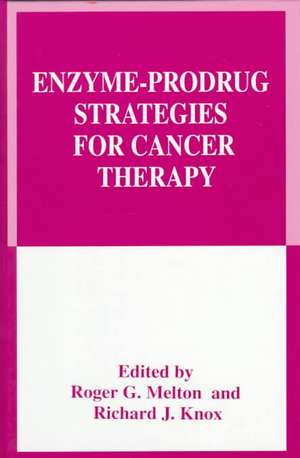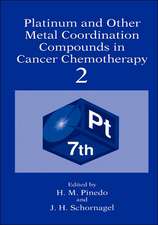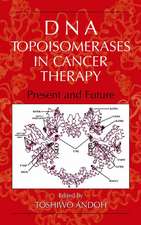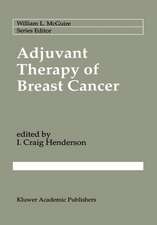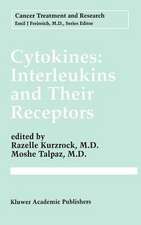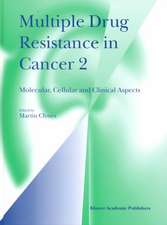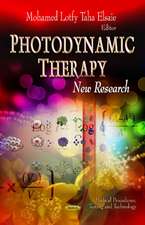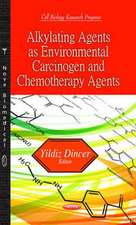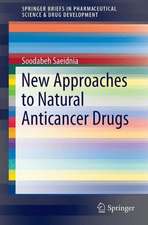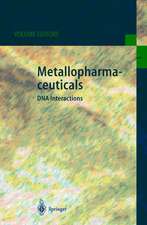Enzyme-Prodrug Strategies for Cancer Therapy
Editat de Roger G. Melton, Richard J. Knoxen Limba Engleză Hardback – 30 ian 1999
This book is the first to describe ADEPT in detail. Each chapter reviews an aspect of the immunology, enzymology, biochemistry, chemistry, and cancer chemotherapy which have been integrated into the ADEPT concept. An additional chapter describes the related approach of gene-directed enzyme prodrug therapy (GDEPT). This latter approach is still in its infancy but ADEPT has entered the clinic. The initial clinical studies with ADEPT are included and discussed in detail.
Toate formatele și edițiile
| Toate formatele și edițiile | Preț | Express |
|---|---|---|
| Paperback (1) | 1408.60 lei 6-8 săpt. | |
| Springer Us – 5 oct 2012 | 1408.60 lei 6-8 săpt. | |
| Hardback (1) | 1415.54 lei 6-8 săpt. | |
| Springer Us – 30 ian 1999 | 1415.54 lei 6-8 săpt. |
Preț: 1415.54 lei
Preț vechi: 1490.03 lei
-5% Nou
Puncte Express: 2123
Preț estimativ în valută:
270.87€ • 289.65$ • 225.84£
270.87€ • 289.65$ • 225.84£
Carte tipărită la comandă
Livrare economică 18 aprilie-02 mai
Preluare comenzi: 021 569.72.76
Specificații
ISBN-13: 9780306458958
ISBN-10: 0306458950
Pagini: 257
Ilustrații: XIII, 257 p.
Dimensiuni: 155 x 235 x 18 mm
Greutate: 0.56 kg
Ediția:1999
Editura: Springer Us
Colecția Springer
Locul publicării:New York, NY, United States
ISBN-10: 0306458950
Pagini: 257
Ilustrații: XIII, 257 p.
Dimensiuni: 155 x 235 x 18 mm
Greutate: 0.56 kg
Ediția:1999
Editura: Springer Us
Colecția Springer
Locul publicării:New York, NY, United States
Public țintă
ResearchDescriere
Antibody-directed enzyme prodrug therapy (ADEPT) directly addresses the major problem in cancer chemotherapy-its lack of selectivity. Antibody delivery combined with the amplification provided by the enzymatic activation of prodrugs enables selection to be made between tumour and normal tissue. ADEPT offers a novel field of opportunities in the therapy of systemic cancer and may be a major advance for the treatment of solid tumours.
This book is the first to describe ADEPT in detail. Each chapter reviews an aspect of the immunology, enzymology, biochemistry, chemistry, and cancer chemotherapy which have been integrated into the ADEPT concept. An additional chapter describes the related approach of gene-directed enzyme prodrug therapy (GDEPT). This latter approach is still in its infancy but ADEPT has entered the clinic. The initial clinical studies with ADEPT are included and discussed in detail.
This book is the first to describe ADEPT in detail. Each chapter reviews an aspect of the immunology, enzymology, biochemistry, chemistry, and cancer chemotherapy which have been integrated into the ADEPT concept. An additional chapter describes the related approach of gene-directed enzyme prodrug therapy (GDEPT). This latter approach is still in its infancy but ADEPT has entered the clinic. The initial clinical studies with ADEPT are included and discussed in detail.
Cuprins
Introduction; R.J. Knox, R.G. Melton. Prodrugs in Cancer Chemotherapy; T. Connors. Factors Influencing Tumor-Selective Localization of Antibody Conjugates; M.A. Sims, R.G. Melton. Enzymes and Prodrugs Used for ADEPT; R.J. Knox. The Design and Synthesis of Prodrugs for Antibody-Directed Enzyme Prodrug Therapy (ADEPT); P.J. Burke. Preparation and Purification of Antibody-Enzyme Conjugates for Therapeutic Applications; R.G. Melton. Phage Technology for Producing Antibody-Enzyme Fusion Proteins; K.A. Chester, et al. Early Clinical Studies with ADEPT; K.D. Bagshawe, M. Napier. Gene-Directed Enzyme Prodrug Therapy (GDEPT) of Cancer; R.J. Knox. Appendix: Enzymes and Prodrugs Proposed for Cancer Therapy. References. Index.
